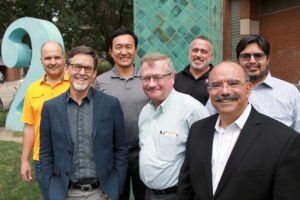Ohio State: Midwestern Hub of Next-Gen Magnetic Resonance Research | Electrical and Computer Engineering
September 13, 2016

Magnetic resonance is one of the most important phenomena in materials and medical research. Its broad range of applications has revolutionized modern technologies, from wireless communication to radar, while saving millions of lives in the medical realms through the early detection of disease.
A team of physicists and engineers at The Ohio State University has now won a $1.071 million award from the National Science Foundation’s Major Research Instrumentation program (NSF-MRI) to help advance the study of magnetic resonance technology at the nanoscale level. Over the next three years, they will work to develop and build new equipment capable of discovering novel magnetic resonance phenomena at a very high frequency range up to 330 Ghz. The Institute for Materials Research (IMR) at Ohio State coordinated the group effort that ultimately led to the winning NSF-MRI award.
Department of Physics Professor and IMR Associate Director Fengyuan Yang, Principal Investigator (PI) on the project, said the technology they are developing could make Ohio State a center for high-frequency magnetic resonance research across the Midwest. Once constructed, the new instrument will be located inside the university’s NanoSystems Laboratory, a facility open to all academic and industrial users.
“This will be the first magnetic resonance spectrometer within this frequency range at a shared user facility in the Midwest,” Yang said, “and it will significantly strengthen and expand the investigation of novel fundamental phenomena and the development of paradigm-changing technologies for researchers at Ohio State and from across the region.”
The NSF-MRI project team includes Yang, with co-investigators P. Chris Hammel, professor of Physics; John Volakis, professor of Electrical and Computer Engineering (ECE); Joseph Heremans, professor of Mechanical and Aerospace Engineering and Physics; Rolando Valdes Aguilar, assistant professor of Physics; Zeke Johnston-Halperin, associate professor of Physics; and Denis Pelekhov, director of the NanoSystems Laboratory.
